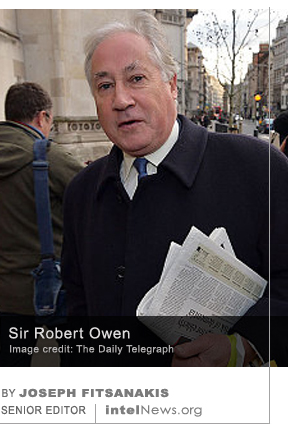Britain summons Russian envoy to protest killing of ex-KGB spy in London
January 22, 2016 3 Comments
 The British government has taken the unusual step of summoning the Russian ambassador to London, following the conclusion of an official inquest into the death of a former KGB officer who is believed to have been killed on the orders of Moscow. Alexander Litvinenko, an employee of the Soviet KGB and one of its successor organizations, the FSB, defected with his family to the United Kingdom in 2000. But in 2006, he died of radioactive poisoning after meeting two former KGB/FSB colleagues, Dmitri Kovtun and Andrey Lugovoy, in London. A public inquiry into the death of Litvinenko, ordered by the British state, concluded this week after six months of deliberations involving sworn testimony by over 60 witnesses, including British intelligence officers who worked closely with Litvinenko.
The British government has taken the unusual step of summoning the Russian ambassador to London, following the conclusion of an official inquest into the death of a former KGB officer who is believed to have been killed on the orders of Moscow. Alexander Litvinenko, an employee of the Soviet KGB and one of its successor organizations, the FSB, defected with his family to the United Kingdom in 2000. But in 2006, he died of radioactive poisoning after meeting two former KGB/FSB colleagues, Dmitri Kovtun and Andrey Lugovoy, in London. A public inquiry into the death of Litvinenko, ordered by the British state, concluded this week after six months of deliberations involving sworn testimony by over 60 witnesses, including British intelligence officers who worked closely with Litvinenko.
In releasing the inquiry report, the presiding judge, Sir Robert Owen, said it was clear that Kovtun and Lugovoi “were acting on behalf of someone else” when they killed their former colleague in London. He added that members of the administration of Russian President Vladimir Putin, including the Russian president himself, had “motives for taking action” against Litvinenko, “including killing him”. Moreover, President Putin’s systematic protection of Lugovoi, the primary suspect in the case, whom Russia currently refuses to extradite to the UK, “suggest a level of approval for the killing” at the highest levels of the Russian government, said Sir Robert.
Speaking during a session in the British House of Commons on Thursday, the UK’s Home Secretary Theresa May described Litvinenko’s killing as “a blatant and unacceptable breach of the most fundamental tenets of international law and civilized behavior”. On the same day, David Lidington, a Minister of state at the British Foreign Office, who currently serves as the country’s Minister for Europe, summoned the Russian Ambassador to London, Alexander Yakovenko, to file an official protest against Litvinenko’s murder. Meanwhile, the British state has moved to freeze the assets of the two main suspects in the case, while British Prime Minister David Cameron said further punitive measures against Russia were possible. Speaking to reporters in Davos, Switzerland, where he is participating in the World Economic Forum, Cameron said Britain wanted to have “some sort of relationship” with the Kremlin in light of the situation in Syria. But Whitehall would “look very carefully at the report and all the detail” and would proceed “with clear eyes and a very cold heart”, he said.
► Author: Joseph Fitsanakis | Date: 22 January 2016 | Permalink







Britain not Brittan – Dr !!
@Peter Wallerberger: Thanks. That’s what having your office in a building called “Brittain Hall” does to your brain. [JF]
Sir Robert Owen’s report is not worth the paper its written on.
Litvinenko and his erstwhile employer Berezovsky were attempting to blacken Putin and his siloviki, whom were locked in a battle for primacy in corralling ex soviet state assets. Hysteria in the west seemed to have revolved around the idea of suitcase dirty bombs. Berezovsky and his associates were trying to implicate Putin and those for whom Putin was a krysha, as purveyors of smuggled nuke material. The FSB found out and allowed Litvinenko and his criminal associates obtain Po., hoping that the UK would become aware and expel Berezovsky and his loud minority. Litvinenko, having anti-Putin form, was the go-between. Lugovoi had worked for Berezovsky but had returned to the employ of his former bosses at the FSB. Litvinenko mishandled the Po. at various locations and died of radiation poisoning.
The continued demonization of Putin as being concerned by the wild accusations of a former int officer far below his cadre to such an extent as to order his elimination in a traceable and historically unique (and of doubtful result) method is laughable at best. That Litvinenko was an MI6 agent is not disputed. Why MI6 would want to be involved with two individuals whom did not have the power base to overcome Putin and his cronies is more puzzling than Litvinenko’s reckless handling of a highly toxic substance.